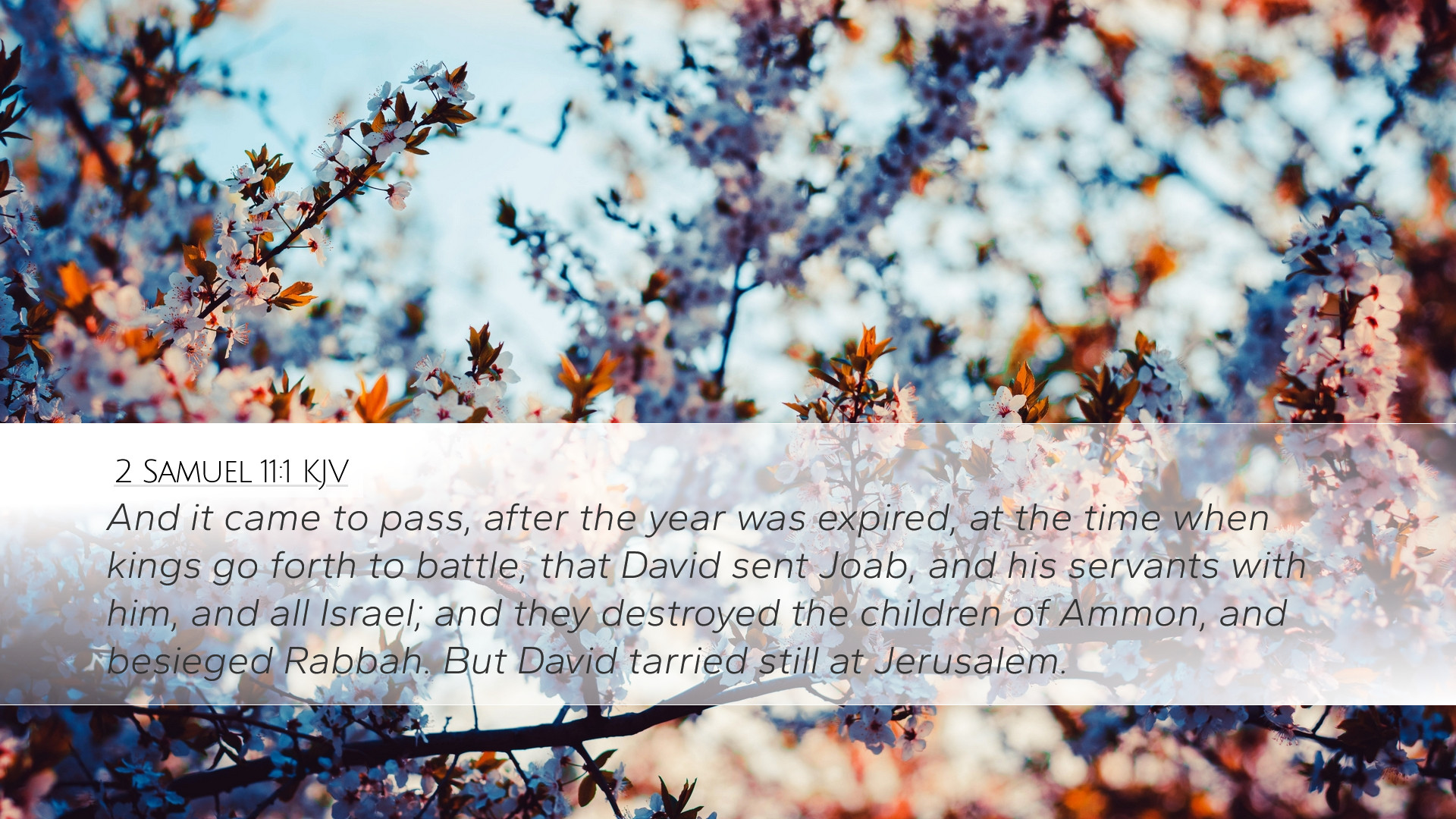Commentary on 2 Samuel 11:1
Text of the Verse: "And it came to pass, after the year was expired, at the time when kings go forth to battle, that David sent Joab, and his servants with him, and all Israel; and they destroyed the children of Ammon, and besieged Rabbah. But David tarried still at Jerusalem."
Introduction
This verse marks a pivotal moment in the narrative of King David’s reign. It sets the stage for the events that unfold subsequently, leading to one of the darkest episodes in David’s life—the incident with Bathsheba. Understanding this passage requires careful consideration of its historical and theological implications. The insights from various public domain commentaries provide a comprehensive exploration of the text.
Contextual Insights
David, as the ruler of Israel, is portrayed here in contrast to the expectations of a king. The season is significant: it is the time of year when kings lead their armies into battle, yet David remains behind. This decision holds profound implications, both for the narrative and for David's personal integrity.
- Temporal Setting: The phrase "after the year was expired" indicates a transition point, suggesting that David’s season of military success has come to a critical juncture.
- Kings in Battle: The expectation in ancient Israel was that the king would lead from the front. Notable military leaders were seen as those who participated actively in warfare. David's choice to stay in Jerusalem deviates from this norm.
Theological Implications
Theological reflection on this verse unearths themes of leadership, temptation, and moral failure. David’s decision to remain in Jerusalem is a precursor to significant personal and national consequences.
- Leadership and Accountability: Commentators like Matthew Henry emphasize the responsibilities that come with leadership. David's absence from the battlefield raises questions about his commitment to his role as king.
- Isolation and Temptation: Adam Clarke notes that David's isolation may have set the stage for temptation. David’s decision to remain alone is juxtaposed with the active duty of his men, highlighting the dangers of idle time and unchecked desires.
Character Analysis
David, a man after God’s own heart, is revealed here as a complex character. His previous victories and adherence to God’s will are contrasted with the moral failings that will emerge in this narrative arc.
- Contrast with Previous Battles: This passage speaks volumes about the trajectory of David’s character. In previous accounts, he exemplified valor and faithfulness. However, here, he is seen languishing in routine, which ultimately leads to his downfall.
- Human Vulnerability: Albert Barnes points out the frailty of human nature. What begins with a seemingly minor decision to defer military duty escalates into a series of grave errors.
Historical Background
The context of surrounding nations, particularly the threat from the Ammonites, amplifies the tension in this verse. Understanding the geopolitical landscape provides clarity to David’s choices and the stakes involved.
- Military Campaigns: The siege of Rabbah indicates that hostilities are ongoing, and engagement is critical for the security of Israel. David’s withdrawal from this campaign can be interpreted as a lack of discernment and vigilance.
- Leadership Models: Throughout the Old Testament, the responsibilities of kingship are laid out starkly. The failure of leaders like David serves as a warning of the consequences of moral laxity.
Moral Lessons
The verse serves as a cautionary tale regarding moral integrity and the avoidance of idleness which can breed sin.
- Idleness and Sin: Matthew Henry’s commentary outlines the pitfalls of complacency. When individuals, especially leaders, neglect their duties, they open themselves up to temptation.
- Role of Community: The absence of accountability is evident. David, by isolating himself, distances from the community that could provide safeguards against moral failure.
Conclusion
2 Samuel 11:1 encapsulates a moment of decision that resonates deeply within the framework of biblical narrative. The weight of David's choice reminds readers of the complexities of leadership, the subtlety of temptation, and the necessity of vigilance in both personal and communal spheres.
This verse encapsulates the essence of caution in leadership and the perils that accompany a departure from one’s responsibilities. As theologians, pastors, and scholars reflect on this text, it serves as both a mirror to our own lives and a lens through which to understand the nature of sin, accountability, and the grace of repentance.


